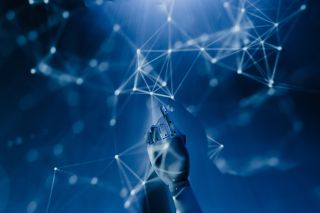Artificial Intelligence
The Psychological Fears Associated With AI
Artificial intelligence is here, but can bring anxiety: the pros and cons.
Updated July 15, 2023 Reviewed by Ray Parker
Key points
- AI is a revolutionary technology on par with the internet and smartphones.
- AI has existed for some time but recent developments have brought it to mainstream attention, such as ChatGPT.
- AI causes some people to have significant anxiety and fear about its implications and potential risks.

From many contexts, AI can be conceptualized as largely a technologically driven psychology.
At its most simple essence, AI is an algorithm-centric approach to recreating the human brain, including neural networks, cognitive functioning, emotional recognition, learning, and potentially even self-awareness.
Although there are many benefits of AI, the rapidity of AI’s expansion has created considerable anxiety in a substantial portion of the population. And yet, we have interacted with AI for many years. For example, have you ever used Siri or Alexa?
ChatGPT
Once ChatGPT was released it captured people’s attention, as AI was no longer experienced solely as a detached quantitative programming function. It was now clearly evidenced as having qualitative properties of direct human interaction with text, images, and videos, resulting in interactive responses to our inquiries.
ChatGPT is a narrow form of AI referred to as generative AI (GAI). GAI uses predictive regression algorithms organized into neural-like networks to automatically generate content from user queries. GAI analyzes raw data, provides outputs based on statistical probability models, and learns from the results (Perna and Turner, 2023).
This direct human-AI interaction has led some people to feel anxiety and even fear the implications of AI. For many, these fears conjure up the worst-case scenario depicted by Skynet in the Terminator movies.
Potential AI Negatives
Some of the most common concerns people voice regarding AI include the following:
1. Dramatic change: AI is revolutionary and being compared to the internet itself, which leads to discomfort for some due to the uncertainty of what it means.
2. Losing control: This is a central concern and revolves around three concepts:
- The decision-making ability of humans could be lost. For example, algorithms providing medical diagnoses and treatment plans could remove physicians from clinical assessment processes.
- AI algorithms could become so advanced that they self-expand without human oversight and limits, leading to unknowable outcomes.
- AI’s development has been extraordinarily rapid. Currently, there is a lack of controls to assure safety. As a result, are regulations needed?
3. Elimination of jobs: Many jobs held by humans could be handled by AI systems, causing potential large-scale unemployment and subsequent adverse economic impacts.
4. AI surpassing human intelligence and humans becoming subservient: Could AI eventually become more advanced and capable than humans? This is referred to as AI superintelligence (AIS). If AI becomes superintelligent and even self-aware, it will be able to do everything a human can do better and faster. This could subjugate humans to the superior-performing AI. Many science and technology leaders, such as theoretical physicist Stephen Hawking and businessman Elon Musk, have espoused the reality of this possibility.
5. Not understanding the vast complexities of AI: When humans don’t understand something as significant as AI, they often become frightened and create embellished stories that are not necessarily true or accurate.
6. AI falling into the wrong hands: This could lead to the powers of AI being used for nefarious purposes.
7. Data security and privacy: Robust controls are not currently in place to ensure data privacy for individuals, companies, and governments, leading to fears of data safety and personal data intrusion.
8. Data accuracy: The sources used to respond to inquiries are not provided with popularly used generative AI such as ChatGPT. As a result, the reliability, validity, and integrity of the results can be uncertain.
Given that AI is already ingrained in many aspects of our lives, we must also consider the positives it contributes. Instead of thinking of Skynet's destructive function, perhaps recalling a more positive image, such as Data from Star Trek, can help.
Potential AI Benefits
The nascent technology of AI provides many benefits, including the potential for the following:
- Mitigating the healthcare system’s administrative and clinical inefficiencies
- Improving clinical assessment, diagnosis, treatment, and patient support
- Identifying and preventing the spread of diseases and health problems
- Reducing human-induced errors in any field
- Decreasing paperwork in all areas of life
- Fostering automation of repetitive tasks
- Improving communication in all realms
- Synthesizing large data sets and producing manageable, actionable information
- Improving customer service
- Developing new medications
- Reducing motor vehicle accidents
- Reducing crime and violence and increasing safety
Considering human evolution and history, we have always encountered changes and innovations in technology. This started with the simplicity of our ancestors learning how to make a fire. We can only imagine that this led to many fears, but these early humans adapted and progressed. The printing press, light bulbs, automobiles, telephones, computers, airplanes, TVs, space travel, the internet, smartphones, and now AI all led to dramatic initial concerns and fears.
Negativity Bias
As humans, we inherently have what is called a "negativity bias." This bias is an evolutionarily driven psychological concept that helped our species survive. Being on the constant lookout for negative stimuli such as a deadly predator or competing clan was essential.
Today, we don’t have to constantly be on guard, seeking dangerous elements in our environments to prevent our demise or harm. Of course, our stress response system does not know this and acts as if everything we encounter is still an emergent stressor, leading to extensive allostatic loads and psychophysiological pathology.
The negativity bias is particularly relevant when encountering new stimuli that bring about substantial changes that we don’t fully understand—such as AI. The resulting uncertainty engages stress-reactive processes, causes anxiety, leads to fears of loss of control, and can even produce existential concerns about human survival.
Part of the issue with which we must contend is that AI’s development and implementation have happened so recently and swiftly that as individuals—and a society—we have not had an opportunity to come to terms with its long-term implications.
As such, we must decide how we want to embrace the positive aspects it can offer while mitigating the anxiety and fears triggered by the potentially deleterious consequences.
I am not attempting to advocate for or dispel the psychological and practical concerns attributed to AI. It is already rapidly integrating into every aspect of our lives. It is here—and it appears to be here to stay.
References
Perna, G. & Turner, B. (2023). Dr. ChatGPT: A guide to generative AI in healthcare. Modern Healthcare. https://www.modernhealthcare.com/digital-health/chatgpt-healthcare-ever…




